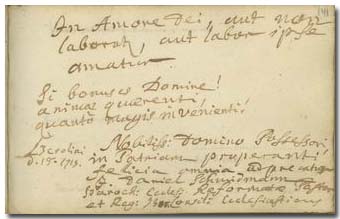
In Amore Dei, aut non laboratur, aut labor ipse amatur.
Si bonus es Domine!
animae quaerenti, *
quantò magis invenienti!
Nobiliss[imo] Domino Possessori, in Patriam properanti felicia
omnia adprecatur.
J. Daniel Schmidmann, Paroch[us] Eccles[iae] Reformatae Pastor et
Reg[ii] Bor[ussini] Consilii Ecclesiasticus.
Berolini […] 15. 1713
|
* The first part of the motto is a
paraphrase of Lam 3:25: “bonus est Dominus sperantibus in eum animae
quaerenti illum” / “The Lord is good unto them that wait for
him, to the soul that seeketh him.”
|
|
|
In the love of God you should either make no efforts, or you
should love the efforts themselves.
If you are good, my Lord, / to the soul who
seeks you,
* /
how much more to the one who finds you!
I wish all the best to the possessor [of this
book], who is returning to his fatherland
J. Daniel Schmidmann,
pastor of the Reformed Church,
and of the Prussian Royal Council
In Berlin, on […] 15, 1713.
|
141. Berlin, [July? August?] 15, 1713
Schmidmann, Johann Daniel
(1663-1728), German Reformed pastor
Johann Daniel Schmidmann (Schmidtmann) had his origins in Pfalz,
in the region of Mannheim. He was born in 1663. He was pastor at
the army of Kurpfalz, then member of the Prussian Royal Council,
and pastor of the Reformed church of Berlin. He died in October of
1728. His works include, besides a number of sermons: Die
nach der herrlichen Freyheit der Kinder Gottes seuffzende Creatur
… Berlin, 1717. – Beruf und Erwehlung zur Seligkeit. –
Lobwassers Psalmen. – Letzter Schwanengesang.
Although
Schmidmann does not indicate the month of his note, he probably
did it at the same time when the other three persons of Berlin, Gundelsheimer, Sterky
and Paul Ernst Jablonski (pp. 387,
143, 361), that is,
in July or August of 1713.
•
Jöcher |

